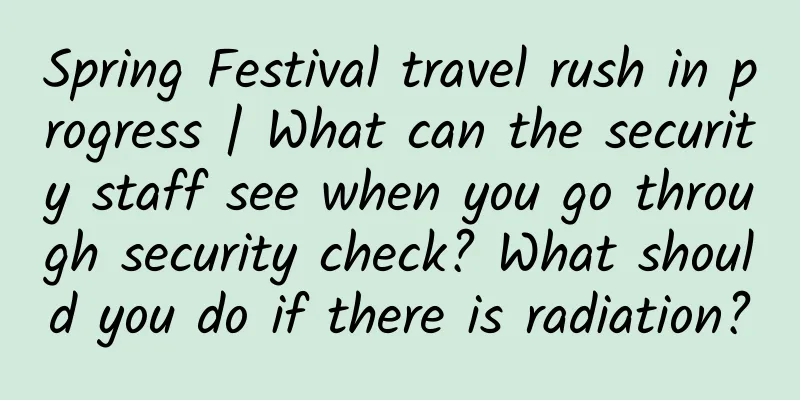Spring Festival travel rush in progress | What can the security staff see when you go through security check? What should you do if there is radiation?

|
Audit expert: Meng Meng Associate Researcher, Institute of Physics, Chinese Academy of Sciences As the New Year is getting closer, the Spring Festival travel rush is on the agenda. At present, many friends have already embarked on the journey home, either by train, high-speed rail, or plane. In this process, I believe everyone has noticed that in addition to crowded stations and long queues, there is another step that is indispensable during the Spring Festival travel rush, that is, security inspection. In theory, it’s just going through a security check machine, no big deal, but there is one thing that everyone is concerned about: is the radiation during the Spring Festival travel security check harmful to the body? This question reminds us of a recent news story: A woman was carrying a durian on the subway. When she went through security check, she met a careful security inspector. While checking the luggage, the inspector also did a "X-ray" on the durian. He also accurately told the woman that there were 5 compartments of flesh inside the durian, just like giving the durian a prenatal check-up. Backpack under security scanner Source: Wikipedia/IDuke The equipment used for security checks is so powerful, but it is a bit scary to think about it carefully. Does it have radiation? Will it harm the human body? 1 What kind of radiation is harmful to the human body? To answer this question, we must first give radiation a "correct name". When talking about radiation, everyone is a little scared, as if being exposed to radiation will cause mutations. But in fact, most radiation is harmless to the human body when used correctly, and radiation is everywhere, and everything has radiation. All objects with a temperature above absolute zero (-273.15°C) continuously release energy through electromagnetic waves and particles (such as alpha particles, beta particles, etc.), which is called radiation. Since no object has a temperature equal to or below absolute zero, it can be said that everything is constantly radiating, including humans. Airport security checkpoint Source: Wikipedia/N509FZ Generally, radiation can be divided into ionizing radiation and non-ionizing radiation according to its energy and ability to ionize matter. Non-ionizing radiation refers to radiation with low energy that cannot remove electrons from atoms or molecules, such as visible light, broadcast waves, infrared rays, microwaves, and radio waves. These radiations are usually not enough to cause cell ionization or significant tissue damage, and are almost harmless to the human body. The key is ionizing radiation, which includes X-rays, gamma rays, and alpha and beta particles, which have enough energy to eject electrons from the orbit of atoms. This radiation is potentially harmful because it can cause damage to cells and tissues, and generally includes X-ray machines (medical equipment), uranium mines, nuclear material radiation, radon gas, etc. Ionizing radiation warning sign Source: Wikipedia However, although ionizing radiation is harmful to the human body, as long as the radiation dose does not reach a certain value, there is no need to worry too much. The dose of ionizing radiation is measured in millisieverts (mSv), and 100 mSv is the limit of harmful dose. A single dose of ionizing radiation exceeding this value may be harmful to the human body, while if it does not exceed this value, the impact on human health is relatively small. 2 How much is 100 millisievert? Let's first understand the measurement units of radiation. The units of radiation mainly include: Becquerel (Bq): This is a unit of radioactive decay activity, named after the French physicist Henri Becquerel. 1 Bq means one nucleus decays per second. Gray (abbreviated as Gy): This is the unit of absorbed dose, named after British physicist Louis Harold Gray. 1Gy represents 1 joule of radiation energy absorbed per kilogram of material. Sievert (Sievert): This is the unit of radiation dose equivalent, named after Swedish physicist Rolf Sievert. 1Sv means that the effect of 1Gy of radiation dose on the organism is equivalent to the effect of 1Gy of X-rays or gamma rays. Rolf Schiffer Source: Wikipedia After conversion, 100 millisieverts of radiation is roughly equivalent to the radiation you would get from being exposed to more than 80 X-ray machines at the same time, while an X-ray examination only exposes you to 1.2 millisieverts of radiation. In addition, the ionizing radiation that the human body is inevitably exposed to in its natural state every year, including radon gas inhaled by the human body and radioactive elements ingested, accumulates to about 2.4 millisieverts. Compared with the harmful dose limit of 100 millisieverts, such a micro-dose of a few millisieverts or a few millisieverts is far from enough to cause substantial harm to people. Therefore, when facing ionizing radiation, we do not need to panic. We just need to keep our personal dose level within the limit set by the state. By the way, some rumors have mentioned that "bananas contain radiation." In fact, bananas do contain trace amounts of the radioactive substance potassium-40, so they do have some radioactivity, but the level is extremely low and does not cause any harm to the human body. The radiation level of a banana is about 0.1 microsievert (μSv), which is a very small value and far below the radiation level that can cause harm to the human body. 3 Is the radiation from security equipment harmful to the human body? During the Spring Festival travel rush, when we go through security with our suitcases we generally have to pass through three devices. We first put the suitcase on the conveyor belt to be scanned by the luggage X-ray security scanner, then we go through the metal security gate ourselves, and the security personnel will scan our entire body with a handheld metal detector, and let us go after checking that there are no problems. Security checkpoint at the railway station Source: pixabay Metal security gates and handheld metal detectors generate non-ionizing radiation, which is electromagnetic radiation, just like mobile phones and computers. Compared with long-term exposure to mobile phones and computers, the short-term and trace electromagnetic radiation from security gates is negligible and will not affect human health when used correctly. Baggage X-ray security scanners are ionizing radiation, but their design and operation meet international standards to ensure that radiation exposure is within an acceptable range. In general, the radiation dose exposed to the moment through the security scanner is extremely small, significantly lower than the level that may cause health problems. Therefore, the radiation during the Spring Festival travel security checks will not cause substantial harm to the body, and we can accept the security checks with confidence. 4 How should we deal with radiation? In daily life, when faced with radiation, we can take some preventive measures to minimize potential risks. For example, avoid unnecessary exposure and do not be exposed to UV rays for a long time. We can also stay away from the source of radiation. Keeping a certain distance can help reduce radiation exposure. In an environment where we may be exposed to ionizing radiation, we can choose to use special protective clothing or protective glasses. If a doctor recommends a radioactive examination or treatment, we should carefully consider the advice of medical professionals and ensure that radiation is used reasonably. Finally, for those who work in an occupational environment where they may be exposed to radiation, they should be tested for radiation levels regularly. In general, when facing radiation, we should just take it easy. There is no need to refuse security check or hospital check-up because of fear of tiny radiation, and there is no need to worry too much because of weak natural radiation. What we need is to maintain appropriate vigilance and take reasonable precautions to minimize the potential impact of radiation on health. |
<<: Nutritional comparison of 22 kinds of nuts, you will never guess the first one!
Recommend
The “last mile” of integrated marketing
When we talk about ROI, it is no longer an abbrev...
These 6 high-tech mobile phone apps will instantly improve the quality of your phone!
After using mobile phones for such a long time, I...
8 hours to complete keyword optimization of an app
I believe some friends are not particularly famil...
4 key thinking styles you need to have when writing public relations copy!
This is an era of information explosion, and it i...
Too difficult to copy? Why don’t new Android flagships have 3D Touch?
As early as last fall, there were multiple reports...
Event promotion plan, execution and implementation!
How to independently design and execute the strat...
Why do users dislike ads? There are 5 factors
Let's get straight to the point. The five fac...
How do Internet tycoons choose entrepreneurial partners?
[[134458]] Before we know it, it is graduation se...
QQ was permanently banned. How did I get it unblocked after more than 200 days?
I believe many people have had the experience of ...
I ate two zongzi and vomited all night! Urgent reminder: Don’t eat zongzi like this!
How many rice dumplings did you eat yesterday? No...
The lurking supporter Yao Mei "Main lifting and detonation actual combat special training camp" 1st issue
Lurking Family Yaomei "Main Lifting and Deto...
How much does it cost to develop a Baotou fast food mini program?
How much is the quotation for Baotou fast food de...
Father’s Day Marketing Promotion: How Can Brands Break Through and Win?
Introduction: As an important festival IP, it is ...
Gigya: 2017 Consumer Attitudes towards Privacy and Security Report
199IT original compilation There are still many t...
Tarot Primary Teaching Baidu Cloud Download
Introduction to Tarot Primary Teaching Resources:...









